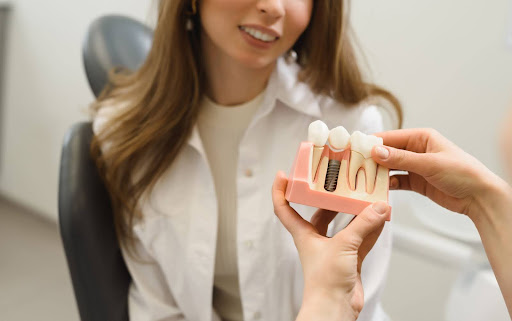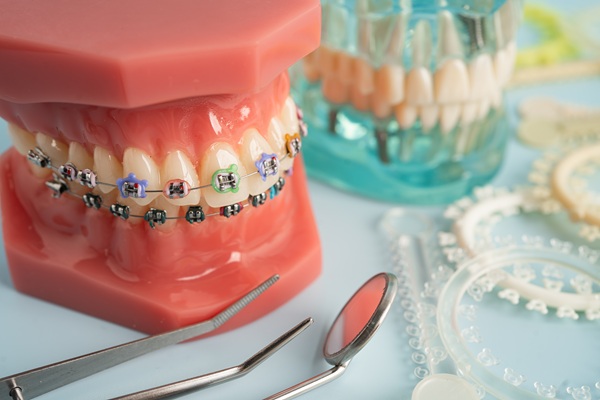Considering dental implants is like opening a new chapter in your oral health story. It’s not just about replacing missing teeth; it’s about feeling good and making a choice for the long run. At Bellevue Hill Dental, we know there might be a few things on your mind, and we’re here to sort them out for you. Join us to find answers to your most pressing questions about dental implants, so you can make an informed decision towards restoring your oral health, smile, and function. Ready? Let’s roll!
1. What are Dental Implants, and How Do They Differ from Other Tooth Replacement Options?
Dental implants are innovative and durable tooth replacement solutions designed to mimic the natural structure and function of your teeth.
A dental implant comprises three essential components; an implant post which is a small titanium post surgically embedded into the jawbone, acting as an artificial tooth root. This artificial root provides a stable foundation for the subsequent components, including the abutment, a connecting piece above the gumline, and the crown or prosthesis, the visible part of the implant designed to match the appearance of your existing teeth.
Dental implants, in comparison to other tooth replacement alternatives such as dentures or bridges, stand out for their unparalleled durability, natural feel, and comprehensive oral health benefits. While dentures and bridges may offer a solution, dental implants provide a long-lasting fix by integrating a biocompatible titanium post into the jawbone, preventing bone loss and maintaining facial structure. Unlike removable dentures, implants offer stability during everyday activities like chewing and speaking. In addition, they do not impact adjacent teeth, preserving overall dental health. With a custom-made crown that mirrors the look and feel of natural teeth, dental implants excel in delivering a durable, functional, and aesthetically pleasing solution for those seeking optimal oral well-being.
2. Are Dental Implants Painful?
The discomfort associated with dental implants is typically minimal and manageable. During the implantation procedure, local anaesthesia is used to ensure you’re comfortable and pain-free. After the surgery, some post-operative soreness is normal, but it can be controlled with prescribed or over-the-counter pain medications. Most patients find the discomfort to be mild and short-lived. Our team at Bellevue Hill Dental will provide detailed post-operative care instructions to make your recovery as smooth as possible.
3. Am I Eligible for Dental Implants?
Your eligibility for dental implants depends on various factors, including your overall health, bone density, and oral health. In general, if you have good oral and overall health, you may be an eligible candidate for dental implants. Conditions such as uncontrolled diabetes or inadequate bone density may impact eligibility, but advancements in implant technology and various techniques have expanded the range of candidates. A thorough consultation with our dentist, involving a comprehensive assessment of your medical history and oral condition, will help determine your suitability for dental implants. If you are considering this transformative solution for tooth replacement, schedule a consultation with us to explore your eligibility and the personalised options available for restoring your beautiful smile.
4. How Long Does the Placement of Dental Implants Generally Take?
The timeframe for dental implant placement can vary based on individual cases. In a straightforward scenario, the surgical procedure to place a single dental implant may take about 1 to 2 hours. However, the overall process takes about 3-6 months, including the initial consultation, any necessary preparatory treatments, the implant placement surgery, and the healing period. Factors such as the number of implants, the need for additional procedures, and individual healing rates contribute to the overall duration of the implantation process.
5. Could My Body Reject Dental Implants?
While extremely rare, the body can exhibit a rejection response to dental implants. They are typically made of biocompatible materials, like titanium, to minimise the risk of rejection. Therefore, the likelihood of rejection is significantly low, as the body generally accepts these materials well. Factors contributing to the success of dental implants include proper surgical placement, good oral hygiene, and overall health. If you have concerns about potential rejection, discussing your medical history and any existing conditions with our dentist can help mitigate risks and ensure a successful implantation process.
6. How Long Do Dental Implants Last?
Dental implants can last for many years with proper care and maintenance. Our Bellevue Hill dentists are committed to guiding you in optimal oral care practices post-implantation, ensuring a prolonged lifespan for your dental implants and sustaining lasting oral health.
7. Are Dental Implants Covered by Health Insurance?
In many cases, dental insurance plans may not fully cover the cost of dental implants, considering them a cosmetic or elective procedure. However, some dental insurance plans may provide partial coverage for certain aspects of the implant process.
Make sure to check with your specific insurance provider to understand the extent of coverage for your dental implant procedure. Discussing your treatment plan with your dentist and the insurance provider beforehand can help clarify what costs may be covered and what you may need to pay out of pocket.
8. Are There Any Risks Associated with Dental Implant Surgery?
While dental implant surgery is generally safe and routine, like any surgical procedure, it carries some inherent risks. Potential risks include infection, damage to surrounding structures, nerve damage, and complications during the healing process.
Fortunately, these risks are minimal, and serious complications are rare. A thorough evaluation of your medical history, proper pre-operative planning, and adherence to post-operative care instructions can help mitigate these risks. Our dentists at Bellevue Hill Dental will discuss potential risks and address any concerns you may have before proceeding with the surgery.
9. How Should I Care for My Dental Implants?
Dental implants demand at-home care similar to natural teeth, involving regular brushing twice a day and dedicated flossing. Your ongoing commitment to routine checkups and cleanings at Bellevue Hill Dental is vital for optimal oral hygiene. While implant teeth are impervious to decay, maintaining the health of surrounding teeth and gums is paramount to prevent inflammation and infection. Consistent care, both at home and with professional dental visits, ensures the longevity and overall well-being of your dental implants.
Have More Questions About Dental Implants?
At Bellevue Hill Dental, we’re more than just practitioners—we’re partners in your oral health journey. Your questions, uncertainties, and unique concerns matter to us. We are here to ensure that every decision you make regarding your dental health is well-informed and aligned with your individual needs. If there’s anything specific on your mind about dental implant treatment in Bellevue Hill, reach out to us. Our team will be more than happy to provide the answers and support you need.



